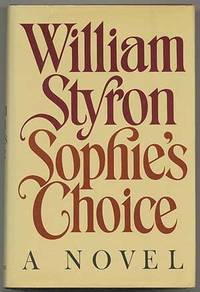A piece of a human being but yes, a human being
 Sophie’s Choice
Sophie’s Choice
by William Styron
I spent most of December re-reading Sophie’s Choice. I wanted to understand what it was about it I fell in love with 10 years ago. I still think it’s a great book, but it has dropped a little in my estimation.
Partly that’s its length. I used to happily read much longer books than I do now. It’s not that I have anything against long books per se, but I have less patience for rambling. I’ve always had a fondness for brevity. This book is not brief. But it is an amazing story.
This is the story of Sophie, an attractive young Polish woman who has survived the Holocaust – has survived Auschwitz – and come to live in Brooklyn, where she works as a doctor’s receptionist and is in a relationship with Nathan, a volatile but charming man who rents a room across the corridor from her. Sophie’s back story is told intermittently between the tale of the second half of 1947.
The title of this book is so familiar, a phrase well known for its hint of torment, but now that so much time has passed since both the book’s publication and the film based on it, many people now will, like me when I first read it, not know exactly what the choice of the title refers to. The novel is structured around gradually revealing Sophie’s secret, but there are plenty of smaller reveals along the way.
But on this read, of course, I knew the whole story from the start, and I don’t think that negatively affected my experience. I guess I was more aware of the artifice of holding the reveal back. But there are very believable reasons for Sophie’s reticence to tell her whole story to the novel’s narrator, Stingo – another resident in the same boarding house.
“Funny, Stingo, you know I have learned to cry again and I think perhaps that means I am a human being again. Perhaps that at least. A piece of a human being but yes, a human being. Often I cry alone when I listen to music, which remind me of Cracow and those years past. And you know, there is one piece of music that I cannot listen to, it makes me cry so much my nose stops up, I cannot breathe, my eyes run like streams.”
Stingo is both the best and the worst thing about the book. He’s a young aspiring novelist, recounting this story from a future point when he is a successful author. (I didn’t realise until after this re-read how many ways the narrator is an autobiographical stand-in for Styron himself.) Stingo is easy company, an open and personable voice with an eye for humorous detail.
He’s a southerner living, in 1947, in New York. He’s conflicted about his southern roots – proud to be a southern gentleman but guilty that he is living off money earned from slavery in relatively recent history. He uses racist language that other characters don’t, but he doesn’t appear to hold any actual racial prejudices, while other characters do, to sometimes awful extent. He’s also obsessed with sex and does have a certain misogyny, or at least a sense of entitlement when it comes to women.
“One of the few tolerable features of life at McGraw-Hill had been my view from the 20th floor – a majestic prospect of Manhattan, of monolith and minaret and spire, that never failed to revive my drugged senses with all those platitudinous yet genuine spasms of exhilaration and sweet promise that have traditionally overcome provincial American youths. Wild breezes whooshed around the McGraw-Hill parapets, and one of my favourite pastimes had been to drop a sheet of paper from the window and watch its ecstatic tumbling flight as it sped across the rooftops.”
Nathan is magnetically attractive to all he meets but also egotistic and quick to anger. He has a hold over Sophie that is both frightening and all-too-believable. Her eagerness to please Nathan makes her an initially disappointing character, and arguably she remains frustrating throughout, but her back story does make a certain sense of this.
The most powerful parts of the story, and most shocking, are those about the Holocaust. Styron makes the point repeatedly – and apparently got some stick for doing so – that it was not only Jews that the Nazis interned and murdered in enormous numbers. Sophie herself is a Catholic; other minor characters we meet at Auschwitz include a Jehovah’s Witness, a lesbian, a Slav, a political conspirator. There is no glossing over the awfulness of the Nazi regime. The 1947 story contains its own darkness and surprises, but it’s sadder, upsetting in a different way.
This time around I still loved the story and the characters. I still found the prose for the most part beautiful, though occasionally pretentious, but it is full of diversions, full of details that other novels would skip. There are sections where Stingo researches the Third Reich to better understand Sophie, which reference dozens of first-hand accounts and historical or philosophical analyses, and frankly all of that could have been skipped.
But then I guess this would be a different book, and as it is, it’s a deeply affecting story with characters who came wholly to life in my head and are still there weeks later. I’d be really interested to know what other people discovering this book in recent years think of it.
First published 1979 by Random House.
Source: I think this was secondhand but it’s so long ago I don’t really remember.